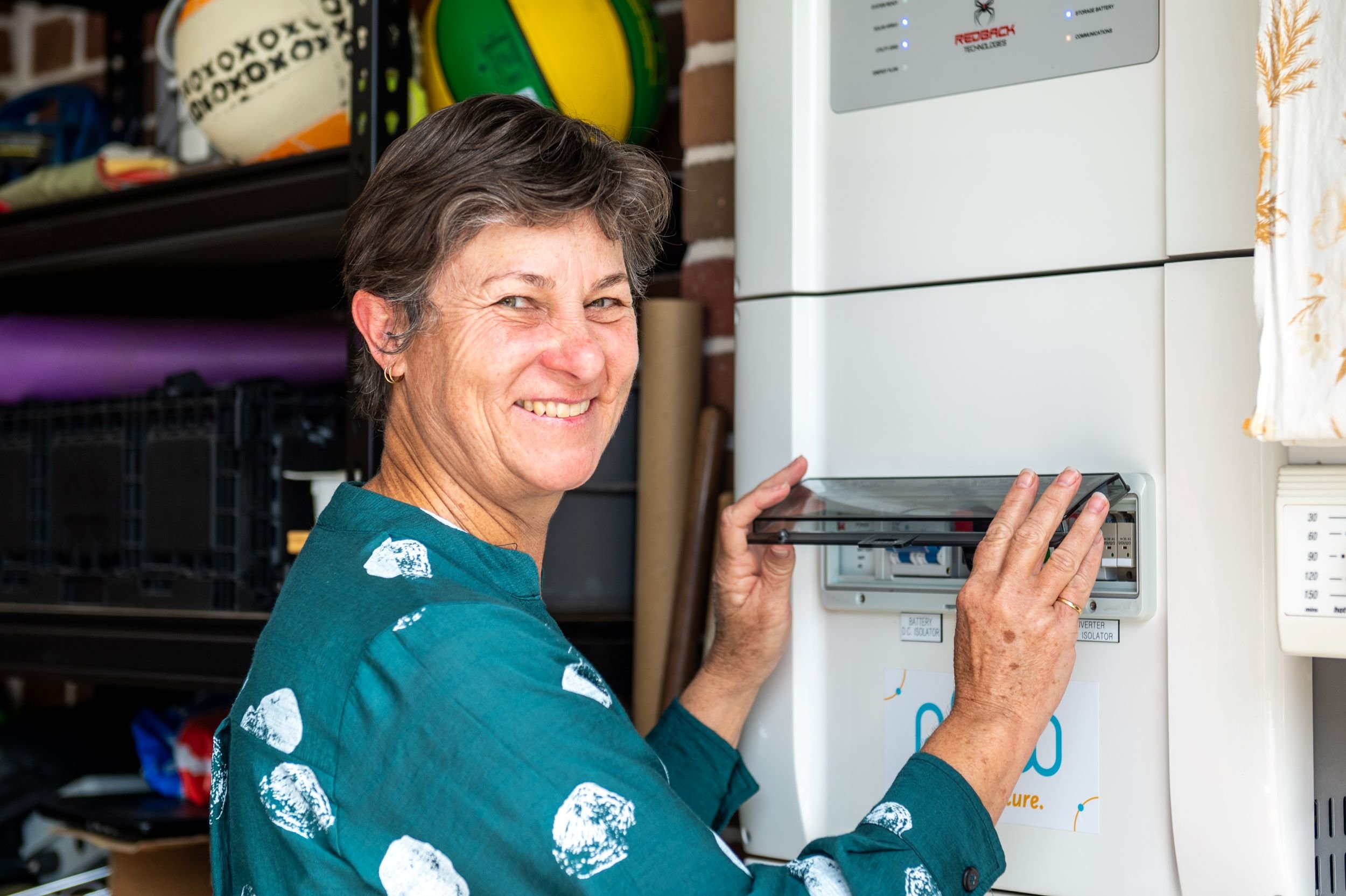Solar can keep the power running during an outage, but you must have a solar battery system with a backup circuit or blackout mode that temporarily disconnects it from the electricity grid.
Power outages are ever-present in Australia (and the world), with any areas capable of suffering from blackouts. With ageing energy infrastructure and increased environmental instability, it’s unlikely much will change in the near future.
The right solar + battery system allows you to run your household appliances off the stored power in your battery. But, bizarrely, there are many unfortunate solar owners whose systems can’t use their solar energy during a blackout, leaving their homes powerless.
A Plico solar + battery system supports you with added protection from blackouts, by powering a dedicated backup circuit – keeping the lights on even when the grid is down. Even if you already have solar, you can experience blackout protection by adding a Plico solar battery.
What causes a power outage?
The four primary causes of power outages are weather, energy demand, infrastructure failure, and motor accidents.
Weather
One of the consistent reasons for your home being plunged into darkness is severe weather conditions, such as high winds, fallen trees, lightning, floods, or heatwaves. Extreme weather places strain on individual pieces of equipment, and a single failure can take down the energy delivery chain of whole regions.
There’s no easy, short-term way of mitigating environmental conditions: we can’t control the weather! However, climate change increases the frequency of extreme weather events; lessening our impact on the environment is a definite way to improve environmental conditions. Regular maintenance of electrical infrastructure and preparation for weather events will reduce weather effects and the regularity of weather-induced power outages.
High energy demand
Another frequent reason for blackouts and power failures is a surge of energy demand that outstrips supply. This can occur any time of year, but hot summer conditions often create this consumption spike when thousands of households run their air conditioners simultaneously. When the electrical grid becomes overloaded, the system may automatically shut down to prevent damage.
At times, load shedding may be implemented to cut off power from certain parts of the grid deliberately. This emergency measure prevents mass blackouts resulting from excessive energy demand. As metropolises become ever denser, with increasing power supplies needed, the risk of dangerous levels of demand continues to rise.
Solar batteries are one of the best ways to diminish the demand spike and lessen the risk of blackouts and power outages. With a personal energy store, in times of peak demand, a household utilises its supply first. Only when the reserve is exhausted will the home pull from the grid. In the summertime, this is usually well after the sun goes down and energy demand has balanced out.
A virtual power plant (VPP) relieves the grid further by creating a network of solar + battery systems, managed remotely, that can function in collaboration while also helping the grid in times of need.
Plico’s virtual power plant
Plico’s created a virtual power plant, and we’ve already used it to support the grid across the Perth and South West regions. Our VPP boasts an impressive 8MWh of battery power – one of the most significant contributions to the energy grid by a VPP aggregator in Australia.
Ageing infrastructure
Power outages are often the result of ageing infrastructure that has begun to fail. The electrical grid’s infrastructure consists of connected components that carry electricity from power plants to homes. When part of this connection becomes defective, the electricity is cut off, and we stop receiving power.
Cables, switches, connectors, and transformers are all essential parts of the electrical infrastructure. However, over time, the prolonged use of this equipment results in its degeneration. This is a pressing issue in Australia, as much of our electrical infrastructure needs to be updated to mitigate issues of breakdown and lessening of the system’s overall capacity. Unfortunately, this is a costly and time-consuming endeavour. Waiting for the power grid to overhaul won’t help you deal with power outages. A key benefit of Plico’s solar + battery system is gaining greater independence and more control over your energy.
Motor accidents
Power outages are frequently caused by motor accidents impacting power lines. For example, a car crashing into a utility pole or knocking down a tree can collapse nearby power lines. This severs the electrical connection to the affected area until repairs are completed.
A range of factors contribute to motor accidents on the road. Difficult driving conditions, such as wet or icy roads, reduce traction, making vehicles harder to control. Mechanical issues, like faulty brakes, affect the safety and reliability of the vehicle. And above all, the driver's condition affects their reactions and judgement. This is especially true for drivers that are intoxicated, tired, or distracted.
Severe crashes have taken out entire power lines, an issue that requires considerable time to resolve and leaves surrounding areas in darkness.
Do solar batteries work in power outages and blackouts?
Solar batteries work in a blackout or power outage if they have blackout protection. Blackout protection is a feature that allows batteries to feed power into your house without a grid connection.
During a blackout, your inverter will disconnect from the grid and operate independently. Your system can still generate, store, and utilise power during an outage. This power will be sent to a dedicated backup circuit in your home.
So long as the sun is shining and your panels are producing, or you have storage in your battery, you will have power to your backup circuit. This can mean days of being essentially ‘off-grid’. However, if your panels are not producing and you have used the blackout reserve in your battery, your home will not have power.
That’s why it pays to be conservative with your energy use when there is a blackout. Our energy monitoring app will help you manage your energy during a blackout.
For a detailed explanation, read our article on blackout protection.
Do solar panels work in a power outage?
Solar panels work in a power outage but won't necessarily power your home. Ordinarily, solar panels send the power they generate to your house and any excess energy to your solar batteries. However, during a power outage, they get disconnected from the grid.
Solar + battery systems with blackout protection provide an alternate connection between your solar panels and your house. Solar panels can bypass the grid by switching to the backup circuit.
If you only have solar panels and a solar inverter, your system won’t be able to provide backup power to your home.
Why does some solar equipment not work in blackouts and power outages?
Certain solar equipment doesn’t work in blackouts and power outages due to the potential risks. Solar panels and solar batteries are a prime example of this. During blackouts, they are cut off from the electrical grid to prevent them from exporting power back into it. While this is usually a safe practice, it becomes dangerous for utility workers during a power outage. Since they are working directly on power lines and are vulnerable to being shocked by electric currents – you must ensure it has blackout protection to continue using your solar + battery system in a power outage.
A hybrid or battery inverter can safely provide power to a backup circuit without the risk of exporting power back onto the grid.

What if I have a separate inverter for my battery?
If your solar PV and solar battery were installed at different times, each would likely have separate inverters. In such cases, if your battery inverter is equipped with blackout protection, you can rely solely on your battery to power your backup circuit without drawing energy from your solar panels.
During a power cut, your solar inverter will automatically disconnect, meaning you won't benefit from its energy even if the sun shines. However, if your panels have already charged your battery earlier in the day, you can use this stored energy to power your backup circuit.
One significant advantage of using a hybrid inverter, which manages both the solar panels and the solar battery, is the ability to utilise your generated energy and store it in the battery for later use, particularly during evenings or extended power outages. This feature can be beneficial in ensuring a continuous power supply.
What to do in a power outage
When a power outage occurs, it’s important to remain calm. Following the recommended guidelines will keep you safe until the situation is resolved.
Initial steps
After ensuring everyone in your home is safe, check for fallen power lines, flickering lights, or appliances emitting shocks. Note these and report them to your power company as soon as possible.
Secondary steps
Your next focus should be minimising electrical damage to your home. Sudden power fluctuations have the potential to harm your electrical appliances. To avoid this, turn off lights and unplug sensitive appliances like microwaves and TVs.
Another helpful tip is to keep your fridge, and freezer closed as much as possible. It lets your food stay fresh for longer, so it doesn’t all go to waste.
Backup options
To ensure a continuous power supply for your home, it is essential to have a reliable backup power source. A solar + battery system is the cleanest, most efficient, and most reliable power source. What's more, it activates automatically, requiring no effort on your part! Our cutting-edge blackout protection has Plico members asking, ‘What blackout?’. And the best thing is it can work independently from the grid for days, so long as your panels keep producing and you are using your energy efficiently.
If you need to know how to utilise the battery’s off-grid function, read our article on preparing for a power outage.
How long do power outages last?
The duration of a power outage varies greatly, depending on the issue. For example, repairing a fallen power pole can take a few hours to a full day or more.
If damage has occurred at a power plant, it may take a week or more to regain power. The longest power outages typically come from damage to underground wires. Since these wires are difficult to access, diagnosing and repairing them often takes weeks or months.
Power outages may be more prolonged if multiple parts of the power grid have been affected. Storms and natural disasters often cause wide-ranging damage to different grid components. The cumulative repairs needed for the different equipment keep the power off longer.
The duration of a power outage varies greatly, depending on the issue. For example, repairing a fallen power pole can take a few hours to a full day or more.
If damage has occurred at a power plant, it may take a week or more to regain power. The longest power outages typically come from damage to underground wires. Since these wires are difficult to access, diagnosing and repairing them often takes longer.
Make power outages a thing of the past
Solar + battery systems don’t have to be a dream that’s reliant on your financial situation. Partnering with Plico means one low weekly fee, so you can start saving immediately without financial stress.
We don’t only have solar + battery systems, but we can also retrofit a solar battery to your existing system! Check out our range of battery-only products.
If you have questions about how a Plico solar + battery system could help you in a blackout, contact one of our switched-on team members or fill out the form below.
Have a question about solar + battery?


